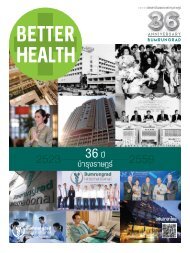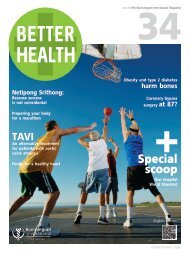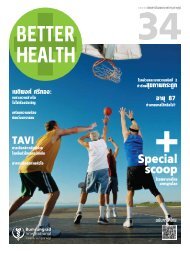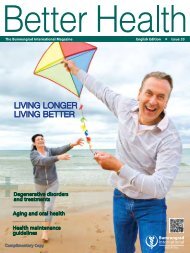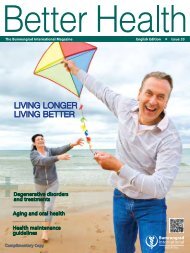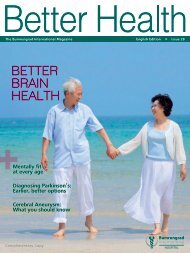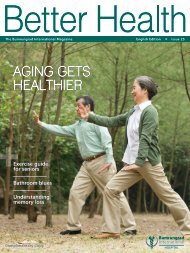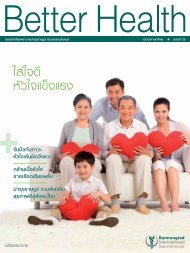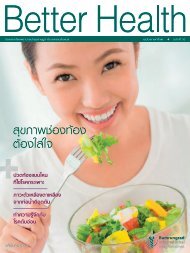All pdf BH Issue 33 Eng
You also want an ePaper? Increase the reach of your titles
YUMPU automatically turns print PDFs into web optimized ePapers that Google loves.
HEALTH MAINTENANCE GUIDELINES<br />
Good health is available for all ages<br />
Good health is the ultimate goal for elderly people in<br />
their retirement, which should be a time of enjoyable<br />
rest and recreation.<br />
At the New Life Healthy Aging Clinic we provide useful<br />
advice for elderly healthcare. With the aim to maintain<br />
good health for our patients, our four practices are simple<br />
and easy to follow: attentive nutrition, regular exercise,<br />
annual health check-up, and vaccination for immunity.<br />
Attentive nutrition<br />
Nutritional problems in the elderly are common and can<br />
cause serious health problems such as weak, degenerative<br />
muscles, low bone mass (osteoporosis and osteopenia),<br />
anemia, weight loss, amnesia, and mood disorders.<br />
In general, older persons should consume between 1,500<br />
to 2,000 kilocalories a day, from all five food groups. We<br />
recommend eating diverse types of foods, spread among<br />
three meals and two snacks per day. Make sure to include<br />
vegetables and fruits to increase fiber intake.<br />
Suggested nutrients for the geriatric diet:<br />
Protein: To maintain and strengthen muscle mass, prevent<br />
muscle degeneration, and repair deteriorated tissue,<br />
elderly people should regularly eat good quality protein.<br />
Find it in lean meat, egg whites, skimmed milk, and<br />
soybean products.<br />
Carbohydrates: This nutrient provides energy to the body.<br />
The older person should consume a sufficient amount<br />
of carbohydrates in order to maintain a suitable body<br />
weight. Choose complex carbohydrates such as brown<br />
rice, whole wheat bread, and millet.<br />
Fat: Older people need only a small amount of fat to<br />
provide the body with enough essential fatty acids and<br />
fat soluble vitamins. They should reduce or limit foods<br />
high in fat such as fat from animals, butter, oil, coconut<br />
milk, and concentrated cream.<br />
Calcium: Older persons should consume at least 1,000<br />
milligrams of calcium daily to prevent osteoporosis and<br />
build bone density. Calcium rich foods are milk and<br />
unsweetened dairy products, soybeans, bean flour sheets,<br />
small fish with edible bones, and dark green and orange<br />
colored vegetables.<br />
Iron: This mineral helps prevent anemia and fatigue.<br />
Foods high in iron include red meats such as lean pork<br />
and beef, green vegetables, cabbage, cauliflower, green<br />
beans, red beans, and black sesame seeds.<br />
Vitamin C: Vitamin C helps the body absorb iron from<br />
foods, prevent scurvy, and heal wounds more quickly.<br />
High vitamin C foods are broccoli, potatoes, sweet peppers,<br />
spinach, papayas, mangos, strawberries, guavas, and<br />
oranges.<br />
Potassium: Consume this to maintain normal blood<br />
pressure, help muscular and nervous systems function<br />
effectively, and maintain the appropriate balance of body<br />
liquid. Potassium rich foods include bananas, oranges,<br />
guavas, dried fruit, tomatoes, cabbage, cauliflower,<br />
broccoli, spinach, oats, and coarse rice.<br />
Vitamin B12: This nutrient is vital for the production of<br />
red blood cells (erythropoiesis), brain cells, and nerves.<br />
A prolonged vitamin B12 deficiency can cause anemia<br />
and amnesia. Vitamin B12 is found in yogurt, milk, whole<br />
egg, and all kinds of meat, such as beef, chicken, pork,<br />
and fish.<br />
Magnesium: This is an essential mineral for the functional<br />
processes of numerous body systems such as the immune<br />
system and bones. It plays a critical role in optimal<br />
nervous system function, and healthy muscles and heart.<br />
Find magnesium in fish, green leafy vegetables, bananas,<br />
and beans.<br />
Vitamin A: It helps maintain eyesight, prevents rapid<br />
vision loss, promotes tissue growth, and boosts the<br />
immune system. Foods with vitamin A include spinach,<br />
carrots, sweet potatoes, papayas, and ripe mangoes.<br />
Vitamin D: Vitamin D facilitates the absorption of calcium<br />
and helps prevent bone diseases. The body can synthesize<br />
vitamin D from sunlight exposure. Older persons who do<br />
not get much sunlight should eat cereals and mushrooms,<br />
and drink vitamin D fortified milk regularly.<br />
Vitamin E: This antioxidant helps prevent the destruction<br />
of body cells. It’s found in avocados, beans, sunflower<br />
seeds, and sesame seeds.<br />
Zinc: This mineral helps the immune system to work<br />
efficiently and helps maintain appetite. Older persons may<br />
need more zinc than younger people, as zinc absorption<br />
decreases with age. Zinc is commonly found in meats,<br />
seafood, and eggs.



